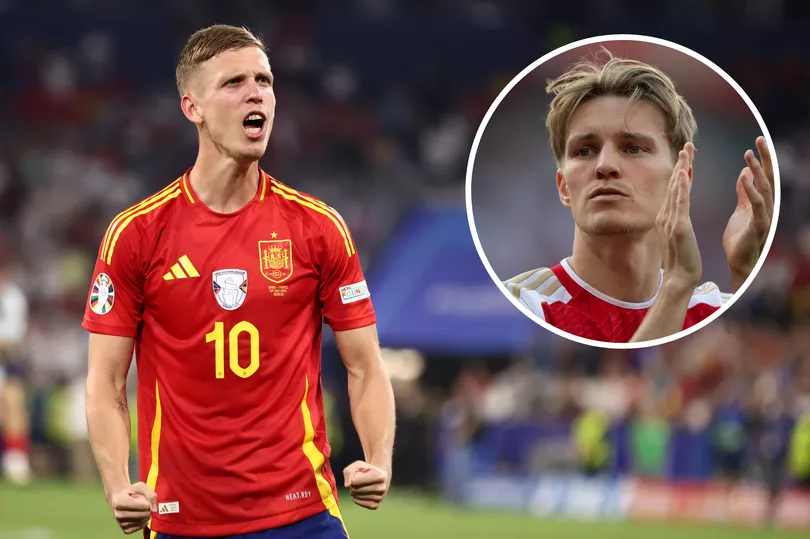Many have started to ask the question about whether Dani Olmo will be wearing an Arsenal shirt come the start of the 2024/25 campaign in August.

The Spain international has looked far and above the best player for the best team so far at the 2024 European Championships in Germany, as he now leads the Golden Boot race with three goals and two assists, the latter meaning he’s ahead of the four other stars that have also scored three times at the tournament.
His winning goal in the semi-final against France encapsulated all the skill and finesse he’s shown not just at the competition, but also throughout the season for RB Leipzig in the Bundesliga as well. Therefore, it’s no wonder that the Gunners have him fixed firmly on their radar.
If Olmo was to arrive at the Emirates Stadium, it’s clear he could provide great cover for a number of stars including wingers Bukayo Saka and Gabriel Martinelli as well as club captain Martin Odegaard, who started all but three league matches for the Gunners this season.
Despite Olmo’s position as an attacking midfielder/right-winger in Leipzig’s 4-2-2-2 system in the Bundesliga last season alongside Netherlands international Xavi Simons, he’s historically played as a central attacking midfielder, much in the same role that Odegaard himself plays for Arsenal ahead of Arteta’s two defensive options.
Since links between Arsenal and Olmo go back to the summer of 2019, many have wondered about how the pair actually compare now that interest in the star has reignited following his stellar Euros campaign with Spain. In terms of per 90 minutes statistics, they’re actually almost identical.
Due to injuries throughout last season, Olmo only managed to play 1,449 minutes or 16 full 90s compared to Odegaard’s 3,091 minutes or 34.3 full 90s, but the impact he had is still very clear to see. While Odegaard managed to hit double digits in both goals and assists last season, he’s still slightly down on Olmo’s stats per game in an attacking sense according to FBref, with fewer goals per 90 (0.25 to 0.23), fewer assists per 90 (0.31 to 0.29) and fewer non-penalty goals per 90 (0.25 to 0.17).
He’s also down on expected Goals (xG) and expected assists (xA) per 90 with Olmo’s 0.55 beating Odegaard’s 0.50. Of course though, there are areas where Odegaard is dramatically better than Olmo, even in the per 90 scenario. The Norwegian’s 6.41 shot creating actions per 90 is far higher than Olmo’s 3.79, his passing completion percentage per 90 of 84.3% is better than Olmo’s 77.8% alongside his goal creating actions per 90 of 0.67, which is above Olmo’s 0.50.
While Odegaard is clearly a much better creative facilitator for his team than Olmo, the Spanish star could match if not surpass him in terms of raw output in front of goal in an area that Arsenal has relied heavily upon for goals over the last few seasons. Defensively, the pair are again fairly equal with differing points in their game being highlighted.
Olmo has a higher rate of tackles and interceptions per 90 (2.42 to 1.87) as well as a better percentage of dribblers tackled (45.5% to 29.3), while Odegaard’s 0.67 blocks per 90 to Olmo’s 0.43 and Olmo’s 0.87 tackles in the defensive third per 90 to Odegaard’s 0.52 shows how both help their team by tracking back much more than you might expect.
Ultimately, Olmo is unlikely to want to play a backseat role to Odegaard though, having originally left La Liga giants Barcelona in search of more minutes – a move which landed him at Croatian side Dinamo Zagreb. There’s no doubt though that manager Mikel Arteta still has plans for his club captain, adamant that he’s still got much more to prove in English football.
Speaking in April earlier this year, Arteta claimed: “[Has he] fulfilled his potential? Hopefully not! There is still more to come. He’s still very young and he’s made huge steps in the last few seasons. He’s got a massive role at the club and hopefully, we can keep growing.
“He had to wear that label since he was 14/15 and that’s not easy. But I think he has handled that in a great way. The steps that he made to progress and to play minutes and develop his career, especially when he went to Real Sociedad – I think that was a really intelligent move. And then from there, he took off and now we have the player that we have.
“He’s our captain. He’s one of our main players and when you look at the impact he has with us daily, it’s amazing. So we are really happy to have him. When I saw everyone this morning, I had to stop them, because winning as well is a big boost of energy.”
It means that Arteta could choose to rotate much more than he usually does with the Gunners, with there being a clear divide of minutes played – the Gunners had eight players who played over 2,650 minutes last season, which equates to almost 30 league matches worth of full 90s; William Saliba was just one of two players across the Premier League to play every minute of the campaign.
Bringing in Olmo could both solidify their base going forward, bring in a new marquee signing for the summer and allow further rotation without the worry of lowering the goalscoring threat on the pitch. It’s a move Arsenal really should be considering but they’ll have to move quickly.
The star’s €60million (£50.7million) release clause in his contract at Leipzig means they have a clear entry to directly negotiate with the star whilst he’s at the Euros which they’ll have to do, given the clause expires the day after the final this weekend.